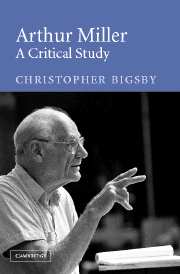Book contents
- Frontmatter
- Contents
- Acknowledgements
- Note on the text
- Introduction
- 1 The Michigan plays
- 2 The Golden Years, The Half-Bridge, Boro Hall Nocturne
- 3 The radio plays
- 4 The Man Who Had All the Luck
- 5 Focus
- 6 All My Sons
- 7 Death of a Salesman
- 8 Arthur Miller: time-traveller
- 9 An Enemy of the People
- 10 The Crucible
- 11 A Memory of Two Mondays
- 12 A View from the Bridge
- 13 Tragedy
- 14 The Misfits
- 15 After the Fall
- 16 Incident at Vichy
- 17 The Price
- 18 The Creation of the World and Other Business
- 19 The Archbishop's Ceiling
- 20 Playing for Time
- 21 The shearing point
- 22 The American Clock
- 23 The one-act plays: Two-Way Mirror, and Danger: Memory!
- 24 The Ride Down Mount Morgan
- 25 The Last Yankee
- 26 Broken Glass
- 27 Mr Peters' Connections
- 28 Resurrection Blues
- 29 Finishing the Picture
- 30 Fiction
- 31 Arthur Miller as a Jewish writer
- Notes
- Index
18 - The Creation of the World and Other Business
Published online by Cambridge University Press: 16 November 2009
- Frontmatter
- Contents
- Acknowledgements
- Note on the text
- Introduction
- 1 The Michigan plays
- 2 The Golden Years, The Half-Bridge, Boro Hall Nocturne
- 3 The radio plays
- 4 The Man Who Had All the Luck
- 5 Focus
- 6 All My Sons
- 7 Death of a Salesman
- 8 Arthur Miller: time-traveller
- 9 An Enemy of the People
- 10 The Crucible
- 11 A Memory of Two Mondays
- 12 A View from the Bridge
- 13 Tragedy
- 14 The Misfits
- 15 After the Fall
- 16 Incident at Vichy
- 17 The Price
- 18 The Creation of the World and Other Business
- 19 The Archbishop's Ceiling
- 20 Playing for Time
- 21 The shearing point
- 22 The American Clock
- 23 The one-act plays: Two-Way Mirror, and Danger: Memory!
- 24 The Ride Down Mount Morgan
- 25 The Last Yankee
- 26 Broken Glass
- 27 Mr Peters' Connections
- 28 Resurrection Blues
- 29 Finishing the Picture
- 30 Fiction
- 31 Arthur Miller as a Jewish writer
- Notes
- Index
Summary
In an essay on the Book of Genesis, Miller commented on the origin of The Creation of the World and Other Business. ‘I think the occasion for this play’, he explained, ‘was the revolts of the Sixties, oddly enough. I was struck, even troubled by, a kind of echo of the Thirties, a time when I had come of age … I couldn't help wondering, at that high tide of idealism and outrage, how they would manage their inevitable, if at the time unmentionable, disillusionment. The Fall had to follow the Creation.’ The story of Genesis ‘appeared to me as myth generated by strictly human dilemmas that no human logic was able to rationalize. It became the story of how man created God, but a god and a cosmology that so beautifully answered to human needs that he ended up being worshipped.’
The play, in which the metaphor behind After the Fall is explored, was, then, as he explained, in part prompted by events in Southeast Asia, even if the setting was the Garden of Eden and its characters included God and Lucifer along with Adam, Eve, Cain and Abel. The war, and its prosecution, once again raised fundamental questions about human nature. The events of the Second World War had not stunned the civilised world into a horror of violence. Vietnam was merely the latest evidence of a seemingly unending taste for resolving differences by conflict.
- Type
- Chapter
- Information
- Arthur MillerA Critical Study, pp. 289 - 294Publisher: Cambridge University PressPrint publication year: 2004



